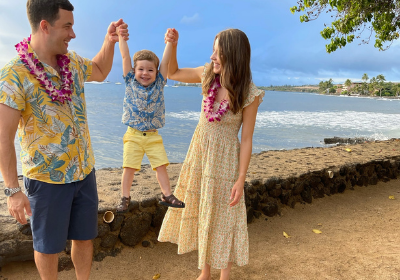November 09, 2021
Meet Ian English, MD
Musculoskeletal Oncologist
Dr. English cares for adult and pediatric patients with benign and malignant bone, muscle and connective tissue tumors. He has a particular interest in treating rare muscle and bone tumors, working in collaboration with medical oncologists, radiation oncologists, pathologists, radiologists and other surgeons to provide comprehensive and coordinated care for his patients. Dr. English also specializes in adult joint reconstruction, performing hip and knee replacements for patients with joint arthritis.
Where are you from? Anything fun/special about your hometown?
I am from St. Louis and grew up in North County (Calverton Park to be exact, between Ferguson and Florissant). The last time I lived here was 2009, and it is good to be home. My parents, sister and extended relatives are all still in town.
What made you choose orthopedics as a specialty?
I chose orthopedic surgery because I enjoy helping people regain function, and the physics and material sciences are interesting to me. I chose my particular subspecialty of musculoskeletal oncology because I found it the most satisfying career in which I can still help people with reconstructing limbs, but also because I help care for sick patients over a long period of time and build relationships. Surveillance of the disease is important in this field, so I develop relationships with patients and see them back for years after surgery. My job also affords me to work with both adults and children, and on more varied anatomy instead of one region (arms and legs and pelvis). Finally, I enjoy the teamwork aspect of this field. I get to work alongside medical oncologists, radiation oncologists, radiologists, pathologists, vascular surgeons and plastic surgeons, on a daily basis.
What brought you to Washington University Orthopedics? How long have you been with Washington University?
Washington University is the best place, in my mind, because of the people. All of the colleagues that treat sarcoma and tumor patients here are leaders in their respective fields. That inspires me to be better every day, and also allows me to see and treat as many sarcoma patients as possible because of the high amount of referrals that comes to WashU from around the world. Sarcoma is a rare disease, and being at a busy center like this allows me to help as many people as possible with this specific diagnosis.
What aspect of your practice do you find most interesting or rewarding?
For me, the most rewarding aspect my career is helping people feel good about his or her treatment plan. I find that when someone understands the next steps of a complicated treatment course (which is standard in Sarcoma), it reduces their anxiety. I enjoy explaining things in straightforward language so that patients can best understand their diagnosis and treatment. And then seeing patients get back to what they care most about is the ultimate reward.
Are you working on any interesting clinical trials or studies right now?
I have many clinical and research interests. Right now one of the things I’m most excited about is getting involved with the national registry for sarcoma through the American Academy of Orthopedic Surgeons. Being involved with this will allow us to have better data and perform more impactful research. Because Sarcoma is a rare disease, most papers in our field have low numbers of patients, and participating in this registry will help WashU, our patients, and people around the country in our field.
What’s on the horizon for recon patient care? What are you excited about?
Surgically one of the things I am most excited about in our field is the ability to make custom metal implants via 3D printing that are specific to the patient’s tumor. This is especially when the tumor is in the pelvis, or in the shaft (middle) of the bone.
What’s the best thing about working and practicing at an academic medical center?
Working at a medical center allows me to learn from my colleagues both in my own division (tumor) and others (joints, pediatrics, spine) and other medical departments (immunology). I think we learn more from overlapping fields sometimes than our own. I also enjoy seeing residents along the course of their education and meeting the next generation of surgeons. Being around learners makes it harder to become complacent, and I am excited to always have people around me contributing to the newest information in our profession through high quality research.
What’s the best advice you ever received and who/what was it from?
The best advice I’ve received was from my residency mentor, Dr. Donald Hackbarth, who said start every interaction by listening to your patient and treat them with respect.
 What’s your favorite thing to do outside of work?
What’s your favorite thing to do outside of work?
Outside of work I like to spend time with my wife, Barbara, and two year old son, Henry. We like to hike, bike, and are excited to explore Missouri. Outside of that I like to build furniture and work on cars.
If you weren’t a doctor, what would you like to be doing?
If I weren’t an orthopedic surgeon I would like to work for the St. Louis Cardinals.
Dr. English treats patients at the Center for Advanced Medicine on the Washington University Medical Campus. Learn more about Dr. English and why patients choose Washington University Orthopedics.